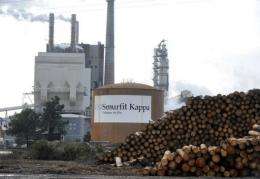Canada teen discovers tree pulp has anti-aging benefits (Update)

A Singapore-born teenager who recently moved to Canada won a national science award Tuesday for her groundbreaking work on the anti-aging properties of tree pulp, officials said.
Janelle Tam, 16, won the $5,000 award in the 2012 Sanofi BioGENEius Challenge Canada for showing that cellulose, the woody material found in trees that enables them to stand, also acts as a potent anti-oxidant.
"Her super anti-oxidant compound could one day help improve health and anti-aging products by neutralizing more of the harmful free-radicals found in the body," Bioscience Education Canada said in a statement.
Tam's work involved tiny particles in the tree pulp known as nano-crystalline cellulose (NCC), which is flexible, durable, and also stronger than steel.
Tam, a student at Waterloo Collegiate Institute, chemically bound NCC to a well-known nano-particle called a buckminster fullerene, or buckyballs, which are already used in cosmetic and anti-aging products.
"The new NCC-buckyball combination acted like a 'nano-vacuum,' sucking up free radicals and neutralizing them," said Bioscience Education Canada.
Since cellulose is already used as filler and stabilizer in many vitamin products, one day Tam hopes NCC will make those products into super-charged free radical neutralizers.
"It would be really nice to commercialize this," Tam, who moved to Canada five years ago, told AFP.
"I envision it more as an ingredient that would be added to existing formulations, so it could be added to tablets or bandaids for a wound dressing or it could be added to cosmetic cream."
She believes NCC may also be superior to Vitamin C or E because it is more stable, so it may work for longer periods of time.
"I think it also opens up a whole new field of research for NCCs," Tam added. "Doing research is like finding out things that no one has found out before, which I find really exciting."
Canada's national forest research institute, FPInnovations, has predicted a $250 million market in the coming decade for NCC.
A pulp and paper mill that opened in January in Quebec now serves as the world's first large-scale NCC production plant.
"When we founded the Sanofi BioGENEius Challenge Canada 19 years ago we believed then, as we do now, in the potential of our youth to develop the next big breakthrough in science," said Sanofi Pasteur Canada President Mark Lievonen, who presented the first place prize.
The judges came from Canada's National Research Council and other leading science institutions.
(c) 2012 AFP















